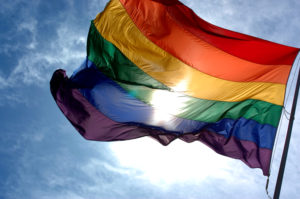Author: Nargis Hamrabaeva, Tajikistan
 In Tajikistan, gays and lesbians were included into a register maintained by law enforcement agencies. However, there are cases when this information is used for blackmailing and intimidation.
In Tajikistan, gays and lesbians were included into a register maintained by law enforcement agencies. However, there are cases when this information is used for blackmailing and intimidation.
In October this year, the Prosecutor General’s Office of Tajikistan published the list of members of LGBTI (the abbreviation was first used in English and stands for lesbian, gay, bisexual, transgender and intersex) groups in the departmental magazine. In the register, there are 319 gays and 78 lesbians. “They have all been identified in the course of operations implemented by the national law enforcement department codenamed “Morality” and “Purge.” The fact that they belong to LGBTI groups has been proved and they have been entered into the police register,” informs the magazine.
HIV experts emphasize that this category of people is one of the populations vulnerable to HIV. “The data of sentinel surveillance in Tajikistan show that in 2015 the level of HIV prevalence among gay men was 2.7%, whereas in 2011 – 1.5%,” says Dilshod Sayburkhanov, the Deputy Director of the Republican AIDS Centre in Tajikistan.
“It will be difficult to regain their trust”
Our interviewees – representatives of non-governmental organizations (NGOs) and LGBTI groups – agreed to comment on the situation provided that they will stay anonymous.
Representative of an NGO protecting the rights of LGBTI (the abbreviation was first used in English and stands for lesbian, gay, bisexual and transgender) told us that, according to the official statistics, currently there are 13.5 thousand members of sexual minorities residing in Tajikistan.
In his opinion, registration with police may lead to people from LGBTI going underground, exposing their partners to even higher risks. “It will be difficult to regain their trust. This is not a way to resolve the problem of HIV. Vice versa, the problem will grow bigger,” he says.
Blackmailing, intimidation and harassment
Our interviewee is sure that the register of LGBT community members is illegal and harmful for the community members. “It is harmful because all law enforcers will have access to this register, which will lead to the lack of confidentiality, intimidation and blackmailing to earn some money,” he shares his thoughts.
Aziz became a victim of such blackmailing. “When an officer of the local police precinct learned that I belong to the community, he started demanding two thousand dollars from me. He threatened that otherwise my photo and information about me will be on TV and in the internet. I have a wife and a family. Therefore, I had to agree, but where is the guarantee that this situation will not be repeated?” he asks.
Rustam, another representative of the LGBTI community said that just recently he suffered an attack in the entrance hall of the apartment building where he lives. “Two guys attacked me, kicked me down on the floor and were beating me with their feet yelling: “No fags in Tajikistan!” Then they ran away. I do not know where they got information about me as I try to hide my way of life. I am afraid that it came from this register. In fact, I could go to the police, since we have got a security camera at the entrance, but decided against it. I know that law enforcers will not protect the rights of such people as myself and it will only worsen my situation,” he says.
In Tajikistan, LGBTI face not only blackmailing and intimidation but also cyberbullying – harassment in the internet. That is why many members of the LGBTI community try to leave the country and seek asylum. According to some reports, in the recent year two gay men and two transgenders from Tajikistan were given asylum in Western Europe because they were victims of harassment based on their sexual orientation.



